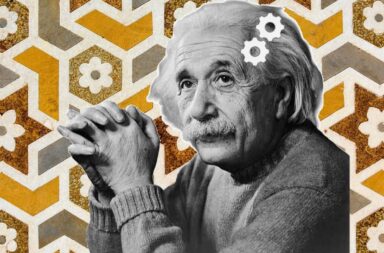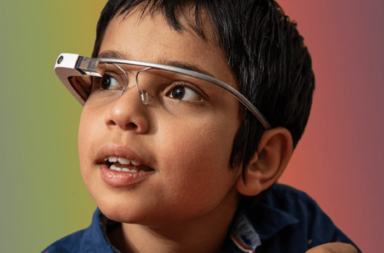A man who struggles to understand his emotions, who is locked away for his violent reactions after harm comes to a loved one, only to be broken out of his captivity and rediscover what it means to be part of a family: ‘Drax the Destroyer’ from Guardians of the Galaxy has a lot more in common with Raymond Babbitt from Rain Man than you may think.
However, unlike the go-to example of autism, which Rain Man has become, Guardians of the Galaxy is often left out of the autism film debate, which is a shame, because in terms of representation (and in terms of plot, lighting, music and not having a scene which features a disabled man watching his brother have sex) Guardians of the Galaxy is an all-around better film. Don’t believe me? Well, today I have detailed 3 reasons which will change your mind.
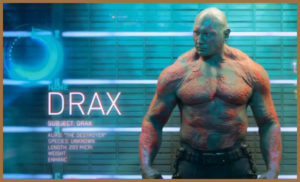
Guardians of the Galaxy is a more REALISTIC depiction of Autism:
No one is going to knock Dustin Hoffman’s incredible performance as Raymond Babbitt anytime soon, but when it comes to giving an accurate depiction of autism,’Tootsie’s’ game was well off.
Whether he’s reacting to moments of danger, or simply enjoying his favourite show, Raymond is never depicted as processing any of the events that go on around him. Yes, he is capable of registering all the information he sees but, other than a few coping techniques, such as his ‘who’s on third’ routine, Raymond is entirely apathetic: depicted not only as incapable of comprehending the feelings of any single person in his life, but also of his own.
Although it isn’t completely unheard of for an autist to struggle in this way, what annoys me and many others on the spectrum, is how this is depicted as common for autistic people – which many still believe in even 30 years later (yep, Rain Man turns 30 this year, feel old yet?)

On the other hand, though the very same can be said about Drax, in that he is slow to think about anyone’s goals other than his own, Dave Bautista offers a much more layered performance of a character with autistic tendencies. Drax may be narrow-minded and also slightly apathetic, but in the background of almost every scene, it is possible to see him reacting in his own Drax way to what’s going on around him.
These responses show that unlike Raymond, Drax isn’t completely devoid of feelings – he just struggles to express them. Something, which in my experience, is all too common; as even with reflexes as fast as Drax, it can often feel impossible for an autist to grasp the words which accurately describe our emotions.
(Side note: I don’t blame anyone for questioning my choice to label the character from a film with a talking racoon as more realistic – especially as Raymond Babbitt is based on a real person. But considering that ‘the real Rain Man’ Kim Peeks is no longer considered to have autism [instead now believed to have had FG Syndrome], you have to ask yourself the question: is it better to have an autistic representation with no exact inspiration or one which is based largely on misinformation?)
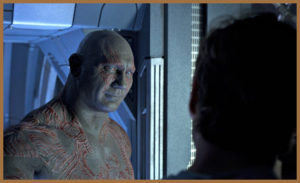
Guardians of the Galaxy is a more POSITIVE depiction of Autism:
So, let’s just say it, Raymond is a JERK. From moments such as refusing to get on a plane, to hijacking a car’s steering wheel, whilst driving down the freeway. Raymond’s only purpose throughout Rain Man is to be as big an obstacle as possible.
This is not to say that people with autism aren’t capable of being jerks (because believe me, I have met my fair share of jerks on the spectrum). However, Rain Man’s answer to ‘why does Raymond do these awkward things’ is often shrugged off as “because he is autistic”.
Conversely, Drax is… ok, well Drax is also a jerk. However, unlike Raymond, Drax’s reasoning behind why he does, what he does is clear – Drax seeks to get revenge for the death of his family and he has spent years killing and destroying anything Ronan/Thanos related to do so (I guess everybody needs a hobby). 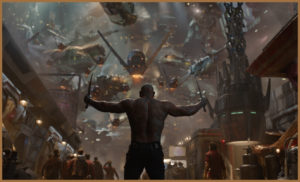
Although this can also be perceived as an autistic person’s obsession causing harm to the people around them, Guardians of the Galaxy makes it clear that Drax is often as much a victim of his actions as anyone else (if not more).
To be fair to Rain Man, this does mean that both portrayals are less than positive in regard to autistic obsessions. However, the representation given in Guardians of the Galaxy is by far lesser of two evils, as Drax’s reasoning boils down to more than: the script’s writers were looking for a way to create some spicy drama.
(It should be mentioned that though it isn’t entirely beyond the realms of reality for an autist’s obsession to have no rhyme or reason, as well as potentially cause harm, this possibility does not excuse the fact that Rain Man uses Raymond’s obsessions solely as a point of contention)
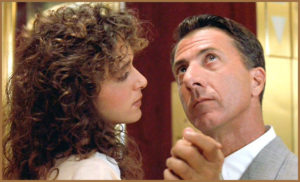
Raymond also steals his brother’s girlfriend… what a jerk.
Guardians of the Galaxy is a more DIVERSE depiction of Autism:
One reason why Guardians of the Galaxy particularly stands out as a better autism film than Rain Man, is because of its diverse representation of the spectrum. Yes, Dave Bautista’s Drax does loosely fit the aesthetic profile of the stereotypical autist: being both white and male. However, he also smashed that stereotype right back, by being the complete opposite of the typical Hollywood poindexter: with social difficulties and an IQ lower than an animated tree (and hey, Dave Bautista does have both Greek and Filipino ancestry so that’s got to count for something).
What really makes the diversity in Guardians of the Galaxy stand above Rain Man though, is when, in the film’s sequel, another character with autistic tendencies is introduced: Mantis (okay, so maybe it’s a little unfair to use two different films to criticise Rain Man’s lack of diversity, but just know that if ‘Rain Man 2: Make it Rain‘ existed I would absolutely be referencing that too).
What makes Mantis an incredible addition to the autistic portfolio within the Guardian’s franchise, is that her autistic traits set her up to depict a completely different end of the spectrum to that of Drax. Mantis is shown to very clearly understand emotions (in fact that is her power), however, she struggles to interpret them with context. Like Drax, Mantis takes everything literally, but whereas Drax is literal in his understanding of words, Mantis takes everything she is told as truth. For example, she smiles unnaturally wide when she meets new people, as she has been told that this is ‘the thing to do to make people like you.’
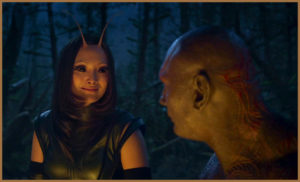
It probably goes without saying, but if Mantis is indeed meant to be autistic (or whatever space variation of autism exists in the Marvel universe), then she is also a rare case of a female autist in film – something which few movies have ever attempted without once again slipping into the generic Hollywood autistic savant: that’s right, I’m looking at you ‘On Body and Soul’.
Maybe we should give Rain Man some credit though, as when it was first released this stereotype hadn’t yet developed. However, if we were to cut Rain Man slack for simply being old, it only further proves how outdated this film has become. To me, this, more than anything, highlights that the golden boy of autism is slowly losing his shine, as by today’s standards of autism awareness and autism understanding, it wouldn’t be too much of a stretch to call Rain Man potentially damaging and offensive to the autistic community.
Whether or not this means people need to stop recommending Rain Man to people with little or no understanding of autism, I’ll let you decide. But if the decision does come back and we do indeed need to find a new standard for autistic depiction within film, well, look no further than the Guardians of the Galaxy (1 and 2).

Carry on the Conversation:
What films do you think depicts autism better than Rain Man? I would love to hear your responses in the comments below. Also, if there are any characters which you think are autistic but haven’t been officially diagnosed be sure to send me those theories also, as I’m always not looking for new examples of autism in fiction.
As always, I can also be found on Twitter @AutismRevised and via my email: AutisticandUnapologetic@gmail.com.
If you like what you have seen on the site today, then show your support by liking the Autistic & Unapologetic Facebook page. Also, don’t forget to sign up to the Autistic & Unapologetic newsletter (found on the side bar on laptops and underneath if you are reading this via mobile) where I share weekly updates as well as a fascinating fact I have found throughout the week.
Thank you for reading and I will see you next Saturday for more thoughts from across the spectrum.
(Photo Credit for all pictures featured: Disney and United Artists)
#RehireJamesGunn
